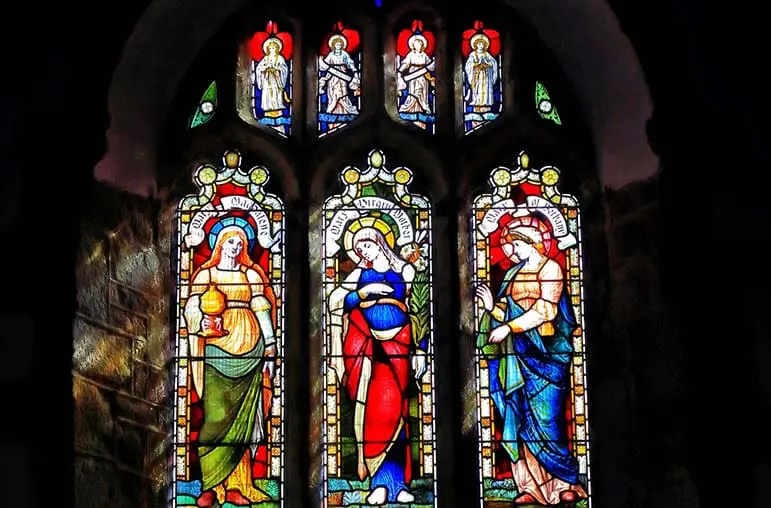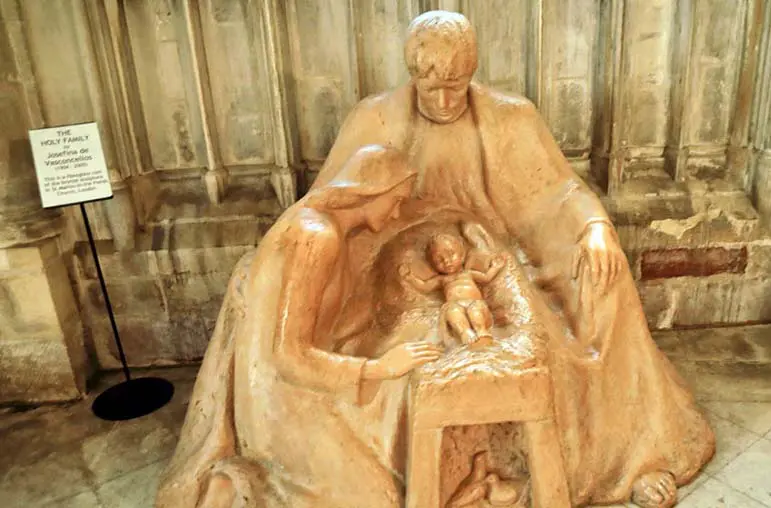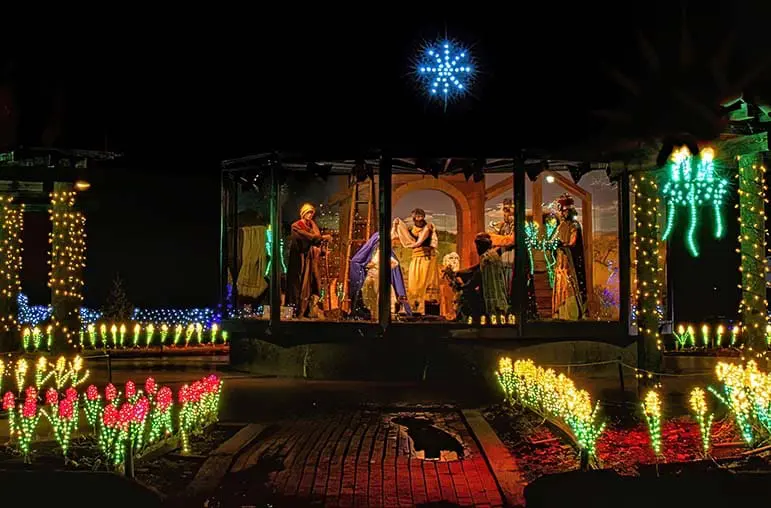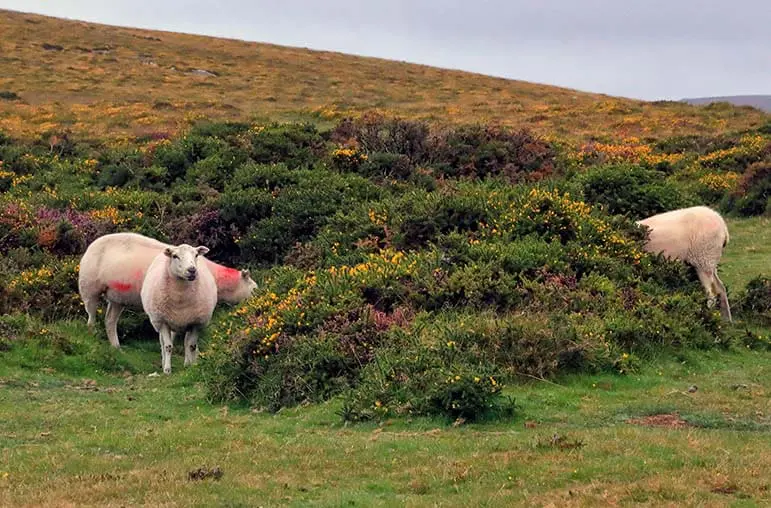
I absolutely love the first two chapters of Luke. It describes the incredible love story of how God gave us the most wonderful gift He could ever give, His Son, His only Son, an infant with the most beautiful name, Jesus, so we could have everlasting life. I love the characters He uses. It begins with an unsuspecting elderly couple, Zacharias, a priest, and his wife Elizabeth, who was barren, being visited by an angel, and not any angel. It was Gabriel, “who stands in the presence of God,” and was sent by Him to tell Zacharias that Elizabeth would have a son in her old age, and he would be called John. Gabriel would leave Zacharias mute until after the baby was born because he couldn’t believe what he was hearing. I would have a little trouble believing that, too. I also love how Gabriel explained that John would be filled with the Holy Spirit even in the womb and be Jesus’ forerunner. Poor Zacharias possessed an amazing story and couldn’t share it with anyone. Can you imagine how excited he must have been when Elizabeth conceived not long after that? It confirmed that he didn’t just dream of Gabriel’s visit; he spoke to him face to face, and the events occurred just as Gabriel foretold.
“For indeed, as soon as the voice of your (Mary’s) greeting sounded in my (Elizabeth’s) ears, the babe (John the Baptist) leaped in my womb for joy.”
Luke 1:44 (NKJV)
Six months later, Gabriel is on another mission for God in Nazareth in Galilee. This time, he visits another unsuspecting couple, Mary and Joseph, who are betrothed to be married. He first sees the virgin bride-to-be. Gabriel was not throwing darts in selecting Elizabeth and Zacharias and then Joseph and Mary to visit. We now understand that this was a part of God’s plan all along and had been prophesied about centuries before: “Therefore the Lord Himself will give you a sign: Behold, the virgin shall conceive and bear a Son, and shall call His name Immanuel,” (Isaiah 7:14 NKJV). While Joseph was of the House of David and Elizabeth’s lineage can be traced back to Aaron, Mary’s is not quite as clear. But she does come from the line of Abraham, Isaac, and Jacob (Luke 3:32-38). I find it not to be a coincidence that Mary was related to Elizabeth when Gabriel explained that Elizabeth, “her relative,” was with child for five months and how helpful that must have been to Mary to accept that she “had found favor with God,” she will “bring forth a Son, and shall call His name Jesus,” and “He will reign over the house of Jacob forever, and of His kingdom there will be no end.” Try to imagine such a scene. It hardly seems possible. In today’s world, I can see a reaction of “What! Who are you again, and what are you trying to sell me? You’ve got to be kidding me! Not Mary!”
“For with God nothing will be impossible.” (Spoken by Gabriel)
Luke 1:37 (NKJV)
She asked some clarifying questions and then believed Gabriel when he said, “For no word from God will ever Fail!” (Luke 1:37 NIV) Mary humbly responded, “Let it be to me according to your word” (Luke 1:38 NKJV). We could learn a lot from Mary. God would be pleased if we would similarly respond when He communicates to us to do something. We may not ever be blessed with a visit from Gabriel, but I do know God speaks to us. One of the best ways to hear Him is by reading the Bible, and the key is “He who has an ear, let him hear what the Spirit says…(Revelation 2:7 NKJV). I love how He nudges me in my Bible study. Those times are so helpful in my walk with Jesus.
It is not surprising that Mary made a beeline to Elizabeth, often considered a cousin, to find out her situation and compare their visits with Gabriel. Imagine this divine scene; it had to be one of the most glorious moments in human history. It is the first time God’s presence in human form came in contact with another person filled with the Holy Spirit. What happened? Baby John leaps for joy in Elizabeth’s womb. What an unbelievable moment of excitement for Elizabeth and Mary, leading Elizabeth to shout, “Blessed are you among women, and blessed is the fruit of your womb” (Luke 1:42 NKJV). I can see God and Gabriel watching and smiling from above as Mary and Elizabeth excitedly recounted each other’s visits from God’s messenger.
We learned at this point that one of Mary’s many gifts was being a songwriter as she spoke what is now known as “Mary’s Song,” which glorifies God for what He had done since the days of Abraham and was going to do for all generations through her son Jesus. She closes the song with “just as He promised our ancestors,” recognizing God had kept His promise to Abraham as described in the book of Genesis (22:16-18). This part of the story may sound interesting, and it is, but more importantly, for me, it reinforces the need for us to glorify God in what He does for us. This morning at church, I heard a testimony of a young woman’s journey where God rescued her from drug and alcohol addiction and then gave her an incredible new life serving Him. She lit up the room and expressed gratitude for God’s faithfulness in changing her life. In some sense, it reminded me of “Mary’s Song” in that she emotionally recounted not only what God has done for her but also how she looks forward to what He is going to do. The lesson here is if we commit to His word, He has great things in store for us.
Mary would stay with Elizabeth for about three months, and that would have been a great help, especially as Zacharias had his priestly duties and couldn’t communicate because he was mute. The story then turns to the birth of John (the Baptist). His name appears controversial as it was expected in those times that he would be named after his father, Zacharias. Remembering Gabriel’s directions, Elizabeth said, “No, he shall be called John.” Oh, the murmurs, how shocking, you can’t name him that. There are no Johns in your extended family. Turning to the mute Zacharias quizzically, those with Elizabeth tried to get his take. On a tablet, he wrote the name John, and with that, he started talking.
Wow, what happened? That got everyone’s attention; many were fearful and wondered, “What kind of child will this be?” What strikes me about this passage is Zacharias’ response. Throughout this silence, he must have been confident about what would happen. It appears he never doubted, and he was much like Mary in her response to Gabriel, “Let it be according to your word.” How do we know this? Because after what must have been almost a year of being mute, his first words were a song of praise and prophesy of the coming Messiah. I can’t even imagine the joy and excitement of Zaharias knowing that his son had been chosen for one of the most essential missions up to that time: to prepare the way for Jesus! I love how God uses seemingly insignificant people to perform His work. The common bond seems to be those who are faithful to His word and glorify Him.

Our story now moves to Judea, where Mary and Joseph had traveled from Nazareth in Galilee to their hometown of birth, Bethlehem. This had to be an arduous journey on foot or a donkey. Try to imagine if, when our census time comes around, we all had to travel to our places of birth. Talk about clogged highways eliciting road rage and crowded airports fueling short tempers. Tired and, I’m sure, stressed, Joseph and Mary, who were nearing childbirth, arrived at this overcrowded tiny village and were unable to find a place to stay. There were no Holiday Inns nor Marriotts, just a solitary inn that was full. The innkeeper must have felt compassion for the weary travelers and offered rest in his stable. I don’t think the nativity scene that would take place was anything like we see on today’s Christmas cards. I’ve seen European stables. They are dark, dank, and smelly, and I’m sure the Mid-East ones of the day were no cleaner. Yet God chose these humble surroundings in this nondescript town as prophesied in Micah for the King of kings to be born. As the Messiah, He came to bring light and hope into a dark world, not to live in luxury and as royalty, but to be a lowly servant and eventually become our Lord and Savior. What better place for the Christ child to be born!
My favorite Christmas carol has always been “Away in a Manger.” As a child, I loved it when my mum would sing it softly to me. That memory warms my heart whenever I hear those beautiful words: “Away in a manger, no crib for a bed, the little Lord Jesus laid down His sweet head; the stars in the bright sky looked down where He lay, The little Lord Jesus asleep on the hay.” As an older man, it is still my favorite as it not only humbly captures the most significant event in history that Luke describes in chapter two, verses 4-7, but it reminds me of God the Father’s love for us by sending His Son to give us eternal life. How great is His faithfulness! I would love to hear my mum softly singing the words one more time. But I think of her each time I listen to it every Christmas. That is such a blessing to relive so frequently. I hope each of you has a similar Christmas blessing from your youth that you cherish and reminds you of God’s faithfulness.
The Nativity In The Gospel of Luke
I love how Luke describes the next scene in the nativity story. It is another favorite piece of scripture that never grows old to me. It elaborates on God’s joy at the momentous occasion that has just taken place with the birth of His Son. Fathers take great pleasure in announcing their children, especially sons. Until recently, you always knew a proud dad when you saw one. He would be carrying a box of cigars and giving them away with such pride on his face. Today, fathers flood their cell phones and Facebook with photos of moms with their newborns. True to form, God used personal messengers (angels) to “bring the good tidings of great joy, which will be to all people.” Also, true to form, he entrusted the greatest news not to the influential and powerful people of that day but to some of the lowest members of society at that time. He sent His angel (we don’t know if it was Gabriel) not to the Sanhedrin, not to the elders of the Jewish faith, nor to other important religious people of the day, but rather to lowly “shepherds living out in the fields.” It might seem odd that He would use such a motley crew rather than those of the faith who knew that God would send them a Savior one day. But God knew the hearts of the religious leaders of the day, and he knew their pride. He chose humble, less educated people he knew could accept this greatest of truth and be willing to tell others. Earlier, I highlighted “all” as I believe it includes even us: “For there is born to you (us) this day in the city of David a Savior, who is Christ the Lord.” This Christmas season, as in every generation, God still looks for humble people willing to share the Good News of Jesus’ birth, His death, and resurrection.
Returning to the scene, the shepherds were watching their flock like any other night. Some may have been dozing, some huddled around a warm fire, drinking something warm, and sharing stories, while others were checking to ensure their sheep were safe from predators. But this wasn’t any other night! “And behold,” suddenly, this stranger is standing among them with amazing light shining all around him. What a startling sight that must have been! You can imagine their expressions of fear: “Where’d he come from? What is that bright light? Who are you? What do you want?” Luke documented their dread: “They were greatly afraid.” But the angel reassured them, and they readily accepted their mission to find the “Babe wrapped in swaddling clothes.” I never knew what swaddling clothes were until later in life. It was ordinary infant clothing that consisted of cloth wrapped around the baby and tied together by strips of fabric to keep babies warm and ensure their legs grew straight. This amazing hillside scene closed with the most magnificent concert ever, with a “multitude of angels singing.”
“Glory to God in the highest, and on earth peace, good will toward men.”
Luke 2:14 (KJV)
What a birth announcement God orchestrated. One never seen like that before or since! It confirms Gabriel’s earlier reassurance to Mary: “For with God nothing will be impossible” (Luke 1:37 KJV). Not surprisingly, it had the intended impact as the shepherds “went with haste and found Mary and Joseph, and the Babe lying in the manger” (Luke 2:16 RSV). Can’t you imagine how excited they must have been, rushing from the hillsides after what they had experienced? I can see the townspeople observing the shepherds, who were overflowing with joy as they ran to see the baby Jesus, and the onlookers shaking their heads in disapproval, thinking, crazy drunken shepherds in town again. Oh, if only cell phones could have captured the shepherds’ expressions as they approached the manger. It must have been one of complete awe and wonder as they reflected on the angel’s words that they would find “a Savior, who is Christ the Lord.” It makes me tear up just contemplating that humble yet majestic scene. God’s Son had stepped out of heaven and was lying there as a helpless infant for them and all mankind.
While Jesus is the Good Shepherd, these local Bethlehem shepherds were good in their own right as they did exactly as God had wanted them to do. They then humbly spread the word that a Savior had been born, “and all those who heard it marveled” at what the shepherds told them. In His infinite wisdom, God knew what He was doing when He chose them for such an important mission; He knew their heart and humility and that they would be willing to accept His word and be obedient. God expects that of us all. But He leaves the choice up to us. Whom do you choose to serve?
This is not the end of the story of how God loves the world. It is only the end of the beginning of what had been prophesied so many times before Jesus’ birth. We have heard this story so many times before. Even though it was enjoyable, I must admit it became a little boring before being saved. It was always, let’s get on with the real reason for Christmas: an opportunity for time off from work, the parties and festivities, the music, football bowl games, basketball season starting, gift-giving, and throwing in an extra church service on Christmas Eve. Then, on December 26, let’s get the tree and decorations down. They’ve been up forever, and it’s time for New Year’s and all its fun. Except for the occasional sweet memory of my mum singing “Away in a Manger,” Jesus, and choosing to serve Him, got little thought. Thankfully, God didn’t give up on me, and as explained in previous testimonies, I gave my life to Him.
Wow, how Christmas changed for me now that I know Him as my Lord and Savior. His Christmas story took on a whole new meaning, filling me with awe and wonder every time I read it. I hope I have captured how much I love Luke’s story of Jesus’ birth. (See below) It is covered in his first and second chapters. The second chapter has more on Jesus’ early life that I haven’t covered here as I wanted to focus only on His birth. Luke doesn’t cover the story of the Three Wise Men. Those events are described in the Gospel of Matthew. The Magi’s incredible journey took place sometime after the events of the Nativity.
Well, folks, I hope you felt my joy in sharing Luke’s story of the most remarkable event in history. I hope it fills you with renewed excitement for the holidays and the coming year. I wish you a Merry Christmas that allows you to enjoy all traditions of the season while you glorify God the Father for sending His son into the world to be a Savior for all.
Until next year, Godspeed.
Main Feature Image: Widdecombe Church window, England © Alan Tucker; additional photos © Alan Tucker; Christmas art: Bigstock.com; THE HOLY BIBLE, NEW INTERNATIONAL VERSION®, NIV® Copyright © 1973, 1978, 1984, 2011 by Biblica, Inc.® Used by permission. All rights reserved worldwide.; Scripture quotations marked NKJV are taken from the New King James Version®. Copyright © 1982 by Thomas Nelson. Used by permission. All rights reserved. Scripture quotations marked KJV are taken from the KING JAMES VERSION of the Bible. Scripture quotations marked RSV are taken from Revised Standard Version of the Bible, copyright © 1946, 1952, and 1971 the Division of Christian Education of the National Council of the Churches of Christ in the United States of America. Used by permission. All rights reserved.





